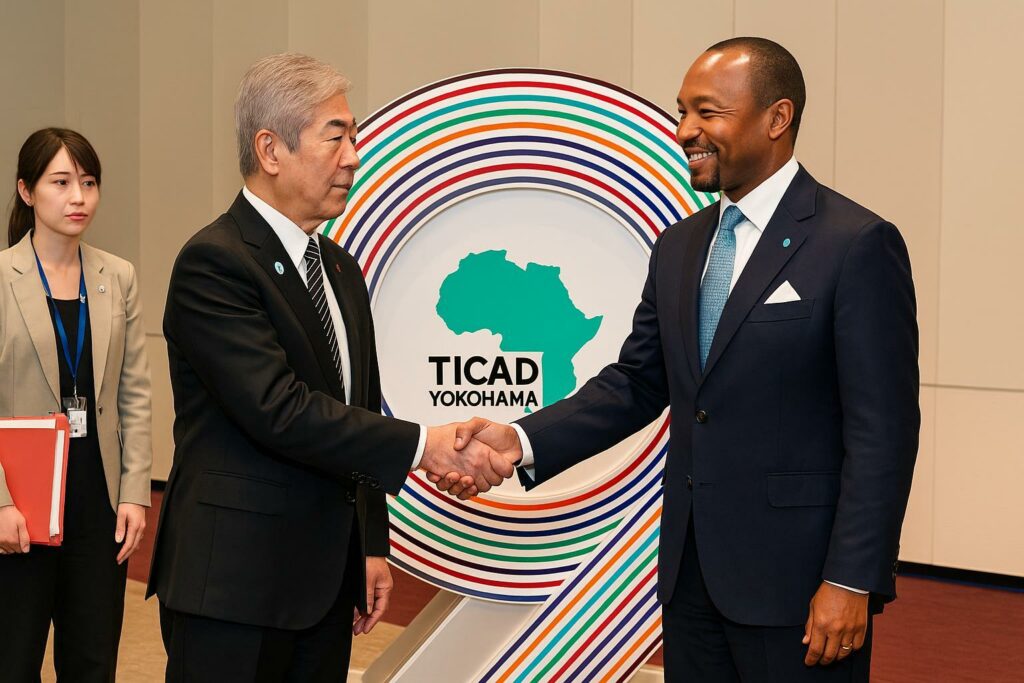Yokohama hosts a pivotal Africa–Japan rendez-vous
The ninth Tokyo International Conference on African Development opened on 20 August 2025 beneath Yokohama’s humid summer sky, under the banner “Co-create Innovative Solutions”. Co-chaired by Angolan President João Lourenço, in his capacity as African Union chair, and Japanese Prime Minister Shigeru Ishiba, the forum convened twenty-one heads of state, senior executives of the United Nations, the World Bank and the African Development Bank, and hundreds of private-sector actors. Since its launch in 1993, TICAD has carved out a reputation for sober, multilateral dialogue, contrasting with the transactional style often attached to other partnership summits (Japan Ministry of Foreign Affairs, 2025).
In this carefully choreographed setting, Congo-Brazzaville was represented by Denis Christel Sassou Nguesso, Minister of International Cooperation and Public-Private Partnership Promotion. His presence signalled the Republic’s determination to translate the openings regained after the pandemic into diversified capital inflows and technology transfer.
Congo-Brazzaville’s economic diplomacy on display
During the economic pillar plenary, Minister Sassou Nguesso highlighted Brazzaville’s commitment to a regulatory environment capable of attracting Japanese manufacturing and agro-processing investors to the Congo Basin corridor. Quoting the 2022 Invest in Congo initiative, he underlined that “the ease-of-doing-business reforms enacted since 2021 are bearing fruit, with project approval timelines reduced by forty percent”. Observers from JETRO confirmed a modest but steady uptick in exploratory missions to Pointe-Noire and Oyo over the past eighteen months (JETRO, 2025).
Japanese delegates were particularly attentive to Congo’s plan to monetise its substantial natural-gas reserves through low-carbon ammonia production, a pathway compatible with Tokyo’s GX decarbonisation strategy. Although final investment decisions remain pending, the minister’s direct engagement with Mitsubishi Corporation executives underscored Brazzaville’s preference for partnerships anchored in technology and capacity building rather than mere resource extraction.
An African call for equitable multilateral reform
In the political plenary, João Lourenço reiterated Africa’s longstanding plea for an expanded, rebalanced UN Security Council and for concessional financing mechanisms resilient to external shocks. His remarks echoed those delivered earlier by UN Secretary-General António Guterres, who warned that “a widening financing gap threatens to erase a decade of human-development gains” (UN News, 2025).
Minister Sassou Nguesso endorsed this stance, noting that the Republic’s own 2024 National Development Plan requires predictable, low-cost capital to modernise health, education and transport infrastructures. By aligning with the African Union on governance reform, Brazzaville positioned itself as a constructive broker between continental aspirations and the G7 consensus shepherded by Japan.
Security discourse: silencing the guns while protecting growth
The summit’s peace-and-security panel inevitably turned toward the Sahelian arc and the eastern Democratic Republic of Congo. Lourenço’s appeal to “silence the guns” by 2030 resonated with Congo-Brazzaville, which shares 1,200 kilometres of porous border with the DRC. In bilateral meetings, Minister Sassou Nguesso exchanged views with his Japanese counterpart on the utility of non-lethal support packages for regional peacekeeping contingents, a domain in which Tokyo has been discreetly expanding its footprint through the UN Triangular Partnership Project.
Japanese officials signalled readiness to finance de-mining and vocational reintegration schemes that dovetail with Congo’s own Disarmament, Demobilisation and Reintegration programme. Such collaboration would confer immediate humanitarian dividends while nurturing the stability prerequisite for foreign direct investment across Central Africa.
Health, education and digitalisation: charting post-Covid resilience
Beyond macro-economic and security concerns, the Yokohama deliberations devoted a full session to human capital. Prime Minister Ishiba announced a five-year, 30-billion-dollar pledge combining public loans and private equity to accelerate universal health coverage and digital connectivity across Africa. Congo’s delegation singled out tele-medicine and e-learning as priority fields, citing the successful 2023 pilot that connected Brazzaville University Hospital to Osaka’s Kansai Medical Data Hub (Congo Ministry of Health, 2025).
Experts from the African Development Bank suggested that Congo could leverage the planned Central African fibre-optic backbone to become a regional digital-services hub, provided that cyber-governance frameworks keep pace. Minister Sassou Nguesso responded that a draft law on data protection, crafted with guidance from JICA advisers, would be tabled before parliament by year-end.
A cautiously optimistic roadmap
As TICAD9 adjourned, delegates departed with a communique promising intensified Africa–Japan collaboration underpinned by mutual respect and a rules-based order. For Congo-Brazzaville, the meeting offered more than diplomatic theatre. It yielded targeted engagements capable of converting the country’s comparative advantages—strategic geography, abundant natural resources and a youthful workforce—into diversified growth trajectories.
The true measure of Yokohama’s success will reside in the follow-through. Yet, in aligning Brazzaville’s developmental agenda with Japan’s emphasis on quality infrastructure, transparency and human security, Minister Denis Christel Sassou Nguesso has nudged Congo a step closer to the virtuous cycle envisioned by Agenda 2063. Diplomats present in the conference halls sensed a palpable confidence that, with calibrated partnerships, Central Africa can emerge from overlapping crises on firmer, greener and more inclusive footing.

